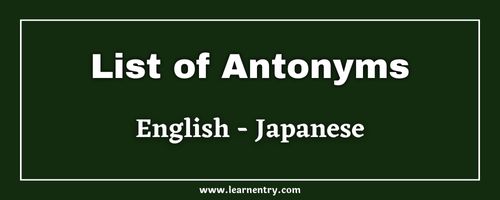List of Antonyms in Japanese and English
To learn Japanese language, common vocabulary is one of the important sections. Common Vocabulary contains common words that we can used in daily life. If you are interested to learn Japanese language, this place will help you to learn Japanese words like Antonyms in Japanese language with their pronunciation in English. The below table gives the translation of Opposites in Japanese and their pronunciation in English.

Top Antonyms in Japanese
Here is the list of most common Antonyms in Japanese language with English pronunciations.
偶然の guzen no
意図的な ito tekina
意図的な ito tekina
人工的な jinko tekina
自然 shizen
自然 shizen
褒め言葉 home kotoba
侮辱 bujoku
侮辱 bujoku
絶え間ない taema nai
変更可能な henko kanona
変更可能な henko kanona
勇気のある yuki no aru
臆病な okubyona
臆病な okubyona
保護 hogo
攻撃 kogeki
攻撃 kogeki